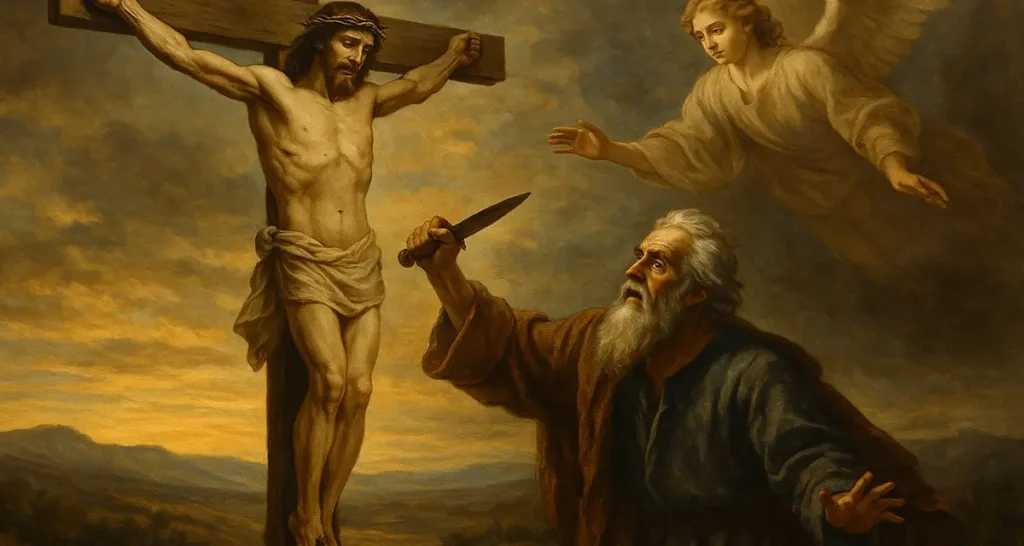Beautiful question—and one that echoes the cry of the jailer in Acts 16:
“What must I do to be saved?” (Acts 16:30)
When a heart is pierced by the reality of the Cross—by the weight of sin and the glory of the Lamb—the next step is not complication, but surrender.
Here is the biblical pathway, laid out clearly and simply:
✝️ 1. Acknowledge Your Need
Salvation begins where pride ends.
“All have sinned and fall short of the glory of God.” (Romans 3:23)
You don’t need to fix yourself—you need to confess that you can’t.
“God, be merciful to me, a sinner.” (Luke 18:13)
🛐 2. Believe in the Lord Jesus Christ
Not just believe about Him—but trust in Him as your only hope, your substitute, your Savior, your risen Lord.
“Believe in the Lord Jesus, and you will be saved.” (Acts 16:31)
“Whoever believes in Him shall not perish…” (John 3:16)
Believing means resting the full weight of your soul on what Jesus has done.
🔄 3. Repent—Turn from Sin to God
Repentance isn’t perfection—it’s direction. It means turning away from sin and toward the Savior. It’s a change of mind, heart, and path.
“Repent, then, and turn to God, so that your sins may be wiped out…” (Acts 3:19)
“Unless you repent, you too will all perish.” (Luke 13:3)
This is not about becoming “good enough.” It’s about laying down rebellion and coming home.
📖 4. Confess Him as Lord
Speak what your heart now believes: that Jesus is Lord and you now belong to Him.
“If you confess with your mouth that Jesus is Lord and believe in your heart that God raised Him from the dead, you will be saved.” (Romans 10:9)
You’re not just accepting forgiveness—you’re embracing a new King.
🌊 5. Be Baptized as a Public Declaration
In the New Testament, those who believed were immediately baptized—not as a magic ritual, but as a visible burial and resurrection, testifying that they now belong to Christ.
“Repent and be baptized, every one of you, in the name of Jesus Christ for the forgiveness of your sins.” (Acts 2:38)
Baptism doesn’t save you—but it confirms your allegiance and obedience to the One who does.
🌱 6. Walk with Jesus Daily
Salvation is not just a moment—it’s a new life. Keep growing. Keep seeking. Keep abiding.
“As you received Christ Jesus as Lord, so walk in Him.” (Colossians 2:6)
“Take up your cross daily and follow Me.” (Luke 9:23)
You are now His. And He is yours. Forever.
🙏 A Simple Prayer of Response
Not a formula—but a cry of faith. If your heart is ready, you can say something like:
“God, I know I have sinned. I deserve judgment, but I believe Jesus died in my place and rose again. I turn from my sin and trust in Jesus alone as my Savior and Lord. I give You my life. Save me, cleanse me, and make me Yours. In Jesus’ name. Amen.”
The next step is often neglected in the personal response to the gospel. After someone receives this great salvation, they must not walk alone.
🏠 7. Find a Spiritual Home—A Gospel-Centered Church
Salvation makes you part of a family, not just a forgiven individual. The early believers were not saved in isolation—they were added to the church (Acts 2:41–42).
You need:
- A place to hear sound doctrine
- A community to grow with
- Elders to shepherd your soul
- A family to walk beside you in joy, sorrow, temptation, and mission
“Let us not neglect meeting together, as some have made a habit, but let us encourage one another…” (Hebrews 10:25)
There is no such thing as a healthy, disconnected Christian.
🕊️ The Spirit Saves Us Into a Body
Just as baptism is a public declaration, joining a church is a lived declaration that you now belong to Christ—and His people.
“You are no longer foreigners and strangers, but fellow citizens with God’s people and also members of His household.” (Ephesians 2:19)
Look for a church that:
- Preaches the gospel clearly and faithfully
- Loves Christ above programs or personalities
- Honors Scripture as God’s Word
- Practices accountability and grace in community
- Points to the Cross every single week
👣 The Holy Steps
Now, the right response looks like this:
- Acknowledge your need
- Believe in the Lord Jesus
- Repent and turn to Him
- Confess Him as Lord
- Be baptized
- Walk daily with Jesus
- Join a spiritual family rooted in the gospel


